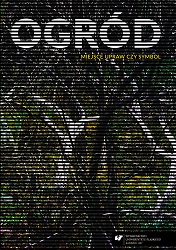Ogrody twórczości, wyobraźni, myśli
The gardens of creativity
Author(s): Dariusz Rymar
Subject(s): Fine Arts / Performing Arts, Photography, Visual Arts, Sociology of Art
Published by: Wydawnictwo Uniwersytetu Śląskiego
Summary/Abstract: The first part of the book presents three main themes which, as a whole, are intended to bea framework for more specific descriptions in its second part. In the first chapter, entitled Realgardens against the myths, the author shows selected examples of landscape designs and discusses theirutilitarian functions, their role in the religious cult, the mythical, symbolic and metaphorical contextswhich have directly affected either programme assumptions of the gardens or a treatment of certainfeatures of the landscape. The cultures of Egypt, Mesopotamia, Greece and Rome are discussedin these respects. The author addresses the intellectual foundation of English and sentimentalgardens to clarify their strong ties with the ancient understanding of the landscape, describing onthis background meaningful features of Arcadia park near Nieborów. The chapter concludes witha discussion of selected solutions in Little Sparta — a garden founded by Sue and Ian Hamilton Finlaynear Edinburgh, Scotland. The second chapter, entitled Gardens of Imagination, discusses literarydescriptions, abstracted from specific landscape implementations. Several examples of literaturefrom different historical periods are invoked, with an emphasis on the role of sensuality. The authoranalyzes the fragments of the Egyptian Book of Gates, the epic of Gilgamesh, the Bible, Divine Comedyof Dante Alighieri, Charles Baudelaire’s Flowers of Evil. The third chapter, entitled The gardensof thought, raises general epistemological issues, first: in terms of the philosophical proposals forovercoming the fear of death, and second: in terms of theory of art viewed from the perspective of thetwentieth-century crisis of the great narrations.The common theme of all the chapters is the Garden of Eden, whose main intentional “function”is to overcome the fear of death. This issue is discussed in the context of eschatological, agnostic,and nihilistic intuitions, organized according to their relationship with specific gardens (Chapter 1),with the literary themes (Chapter 2), and finally with the abstract contemplation on the conditionof mankind and its representation in contemporary art (Chapter 3). Such a structure, inspired byHegel’s description of the history of the Absolute, makes it easier to present the problems of gardensfrom various perspectives — specific relations with nature, aesthetic experience and thought of purelyintellectual character. This approach, on the one hand, serves the clarity of argument by avoidingexcessive complexity of description, and on the other, shows the complexity of the concept of “garden”,resulting from the build-up of different meanings over the millennia.
Book: Ogród – miejsce upraw czy symbol
- Page Range: 15-79
- Page Count: 65
- Publication Year: 2017
- Language: Polish
- Content File-PDF

